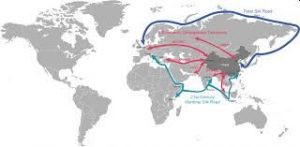https://www.freepressjournal.in/business/blending-education-and-the-belt-road-initiative
Mumbai: By the end of August 2019, China has been able to strike deals with not just 136 countries but also 30 international organisations to implement projects that fall under Belt and Road initiative (BRI).
Other than signing agreements with countries that directly fall under this initiative; China has also signed agreements with third-party markets like France, Japan, Italy, the UK etc, to establish a multi-lateral market cooperation mechanism.

This shows the acceptance level of various country governments, but China wants to go a step further and engage with experts and communities too.
In an attempt to further increase engagement and change perception about itself, China has introduced many educational programmes and sessions to create awareness about BRI.
The China’s Ministry of Education under ‘Education Action Plan for the Belt and Road Initiative’ is looking at increasing cooperation and joint action by the BRI countries. The country is giving utmost importance to education to nurture talent in order to make the initiative successful.
In its official communication, “China is ready to work with the countries along the routes to expand people-to-people exchanges, strengthen cooperation in the cultivation of talent, and together create a bright future for education in the region.”
There is no doubt that education is key for development for any individual and that is why China is focussing on improving skills and building the talent base of people.
As per Education on the Belt and Road report, it was stated that as of April 2018, more than 50 Chinese Technical and Vocational Education and Training (TVET) institutions had cooperated with foreign industries to jointly provide vocational skill training.
Among the 10,000 teachers that were trained under this programme from 12 countries, India was one of the beneficiaries, even though India is not yet a signatory to the BRI proposal for a variety of reasons.
Around five Luban (The project is named after LU ban, the father of Chinese architecture from around the 4th century BC) workshops have been officially opened in India with support of three schools – Tianjin Light Industry Vocational Technical College, Tianjin Vocational College of Mechanics and Electricity and Chennai Institute of Technology.
At these centres, local personnel will be trained which would enable them to work with Chinese enterprises. In case of India, the Indian government has not signed any direct agreement relating to the BRI. However, it has attracted USD 12,014 million between the period 2013-2018 under BRI funding, according to a paper published by the World Bank. The paper further added that India can witness an additional growth of 0.08 per cent due to BRI investments in 2019.
It is estimated that from January to June 2019, Chinese companies signed 3,302 new deals for contracted engineering projects in BRI countries.
According to one Chinese think tank, the contract value rose by 33 per cent year-on-year to USD 63.64 billion, accounting for 60 per cent of the total value of new projects contracts that China had signed overseas during the same period. This highlights the opportunities that will be available to skilled talents in the BRI countries.
In addition to these technical training institutes, the Chinese are setting-up primary schools as well as part of the cultural exchange under BRI, (going beyond infrastructure but more as a goodwill gesture).
The very first primary school which was part of such a cultural exchange was China Africa Friendship Primary School which was constructed in 2013, in Comoros.
As an extension to the BRI, China has – since 2015 – promoted within its country special educational courses that focus on African culture that too at primary schooling level. These select schools are the first of their kind in China, and are a symbol of the symbiotic relationship between Africa and China.
Commenting on China’s focus on education, Professor Wu Minsu of the Communication University of China (CUC) said, “China values education a lot. It considers it important to improve the standard of living of an individual and its family.” She added in China, local leaders go door-to-door to encourage kids to attend schools.
“We have nine years of compulsory school in the country. Education has changed people’s lives,” stated Wu, who feels education system has helped her to have a better life as well.
Further, Li Xu, project manager, department of International Cooperation, said, “While China provides nine years of compulsory education with minimal fee, it is very strict when it comes to higher education. The competitive examination for higher education ensures that only the best make it to the universities.”










































COMMENTS